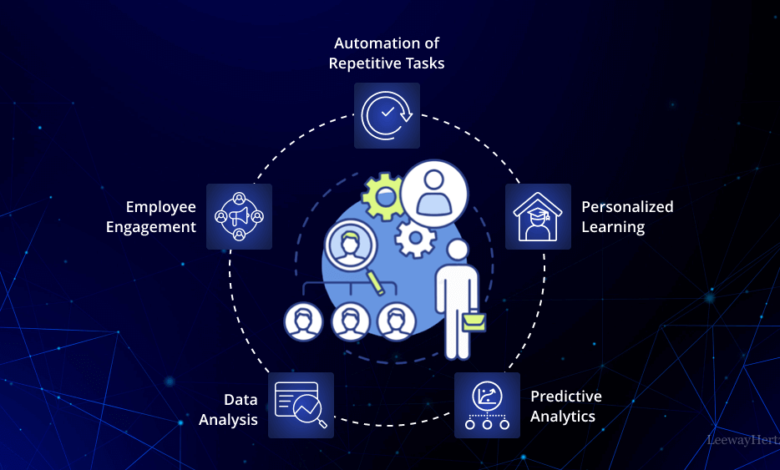AI in the workplace: Transforming modern work dynamics | by LeewayHertz | May, 2024

AI is transforming the modern workplace, freeing humans from tedious tasks to focus on creativity and innovation. Deloitte’s report reveals that 79% of businesses have fully integrated three or more AI categories, signaling widespread adoption. Incorporating AI is now a necessity, not a choice, enhancing job quality rather than replacing it. It streamlines operations, enabling quicker and more accurate decision-making, which is essential in today’s fast-paced world. As industries evolve, AI becomes indispensable for staying competitive. Engaging the services of an AI development company can significantly expedite this transformation. These companies offer specialized expertise and tailored solutions to navigate the intricacies of AI integration efficiently. By leveraging their knowledge and experience, businesses can effectively implement AI technologies and maximize their impact on workplace productivity and innovation.
This article explores AI’s impact, from applications to implementation and benefits, ultimately shaping smarter and more agile workplaces.
AI is transforming workplaces, leading to automation and intelligent decision-making across industries. From streamlining mundane tasks to optimizing complex operations, AI augments human capabilities, boosting productivity and efficiency.
AI-powered chatbots and virtual assistants, powered by Natural Language Processing (NLP) and Machine Learning (ML), provide consistent customer service, freeing up human staff for higher-level tasks. Predictive analytics harness AI’s prowess to analyze vast datasets, predicting market trends and guiding data-driven decisions with increasing accuracy over time.
AI fosters collaboration through real-time data analysis and communication tools, such as AI-powered analytics platforms and collaborative robots, enhancing teamwork and decision-making.
However, integrating AI poses challenges, requiring workforce upskilling and careful consideration of ethical and societal impacts. Organizations must prioritize AI literacy among employees and ensure ethical AI deployment, promoting fairness and transparency.
As AI progresses, successful integration relies on embracing technology while nurturing a culture of ongoing learning and adaptability. Companies mastering this balance will leverage AI’s transformative potential, driving innovation and competitive advantage in the modern business landscape.
AI in the workplace offers diverse applications:
- Automation of repetitive tasks: AI streamlines operations by handling routine tasks like data entry and basic customer support, boosting speed and accuracy while freeing up human employees for higher-level responsibilities.
- Data analysis and decision-making: Machine learning algorithms swiftly process large datasets, extracting actionable insights for informed decision-making, strategic planning, and market forecasting, enhancing agility and competitiveness.
- Predictive analytics in workplace management: AI analyzes employee performance data to anticipate challenges, optimize resource allocation, and enhance overall operational effectiveness, fostering proactive problem-solving.
- Chatbots and virtual assistants: AI-driven chatbots automate routine queries and administrative tasks, improving communication efficiency internally and externally while allowing employees to focus on strategic activities.
- Communication, collaboration, and culture: AI-powered tools facilitate real-time language translation, project management, and sentiment analysis, fostering a connected and innovative work environment.
- Personalized learning and development: AI tailors training programs to individual employee needs, improving skill acquisition and engagement while aligning learning objectives with organizational goals.
- Employee engagement and feedback: AI analyzes employee sentiment and facilitates real-time feedback, enabling organizations to implement targeted initiatives that boost morale and satisfaction.
- Cybersecurity: AI-powered systems detect and respond to cyber threats in real time, enhancing adaptive defense mechanisms and safeguarding digital assets against evolving risks.
- Workflow optimization: AI optimizes workflows by automating tasks, reducing manual interventions, and improving resource allocation, increasing productivity and cost-effectiveness.
These applications demonstrate how AI enhances efficiency, decision-making, and innovation in the workplace, serving as a transformative force in modern business operations.
Integrating AI into the workplace offers numerous benefits:
- Increased efficiency: AI automates repetitive tasks, leading to faster processing times and reduced errors, enhancing overall operational efficiency.
- Cost savings: By streamlining processes and improving productivity, AI helps businesses save on costs and optimize resource allocation.
- Improved decision-making: AI examines vast amounts of data quickly and accurately, providing actionable insights that support informed decision-making and strategic planning.
- Enhanced customer experience: AI-driven tools like chatbots and virtual assistants provide instant support and personalized interactions, improving customer satisfaction and loyalty.
- Workforce augmentation: AI augments human capabilities by handling routine tasks, enabling employees to focus on higher-value activities that require creativity and critical thinking.
- Personalized learning: AI tailors training programs to individual employee needs, improving skill acquisition and performance while fostering a culture of continuous learning.
- Improved security: AI-driven cybersecurity systems swiftly detect and respond to threats, bolstering data protection and reducing the likelihood of cyber-attacks.
Implementing AI in the workplace involves several key steps:
- Identify business needs: Understand your organization’s specific challenges and opportunities where AI can make a meaningful impact. Consider areas such as automation of repetitive tasks, data analysis, customer service enhancement, or process optimization.
- Set clear objectives: Establish specific and quantifiable goals for AI implementation to guide the integration process effectively. Determine what success looks like and how AI will contribute to achieving desired outcomes.
- Assess data availability and quality: Assessing the availability and quality of data within your organization is crucial for AI implementation, as AI heavily depends on data for training and decision-making. Ensure that data is clean, relevant, and accessible for AI applications.
- Select suitable AI technologies: Choose AI technologies and tools that align with your identified business needs and objectives. Consider factors such as scalability, compatibility with existing systems, and ease of workflow integration.
- Model development and training: Develop AI models tailored to your organization’s needs and objectives. This involves selecting appropriate algorithms, preparing and preprocessing data, training the models using supervised or unsupervised learning techniques, and fine-tuning them to achieve optimal performance. Collaborate with data scientists, engineers, and domain experts to iteratively refine and improve the models based on feedback and validation results. Ensure that the models are scalable and capable of delivering accurate predictions or insights to support decision-making processes in the workplace.
- Monitor and evaluate performance: Continuously monitor the performance and impact of AI implementations against predefined objectives and KPIs. Regularly assess ROI and make adjustments as necessary to optimize outcomes and drive continuous improvement.
- Pilot projects: Start with small-scale pilot projects to test AI solutions in real-world scenarios and evaluate their effectiveness. Gather feedback from users and stakeholders to iteratively refine and improve AI implementations.
- Invest in training: Cultivate AI proficiency through investment in training initiatives and recruitment of proficient AI specialists. Ensure that employees understand the benefits and potential implications of AI adoption.
- Scale up gradually: Once pilot projects demonstrate success, gradually scale up AI implementations across relevant areas of the organization. Continuously track key performance indicators and adapt strategies to optimize effectiveness and return on investment.
- Ensure ethical and regulatory compliance: Consider ethical implications and regulatory requirements for AI implementation, such as data privacy, bias mitigation, and transparency. Implement safeguards and protocols to ensure ethical and responsible use of AI technologies.
- Promote adoption and collaboration: Foster a culture of openness, collaboration, and continuous learning to encourage employees to adopt and integrate AI technologies. Provide ongoing support and resources to facilitate smooth transitions and address any challenges.
Integrating AI in the workplace represents a transformative shift towards enhanced efficiency, productivity, and innovation. As businesses across various industries embrace AI technologies, they unlock new opportunities for automation, data-driven decision-making, and improved customer experiences. From streamlining operations and optimizing workflows to fostering collaboration and driving competitive advantage, AI has become an indispensable tool for modern organizations.
Looking ahead, the role of AI in the workplace is poised to expand further as technology continues to evolve. Companies will increasingly rely on AI development companies to develop customized solutions tailored to their needs and objectives. These specialized firms bring expertise in AI algorithms, data analytics, and software development, empowering organizations to harness the full potential of AI to address complex challenges and drive business growth.



